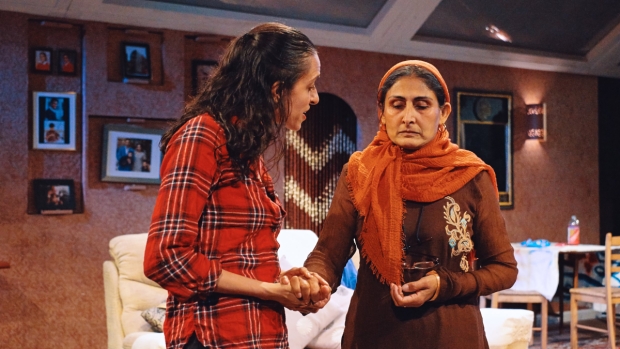
© Suzi Corker
Female kinship and the ties that bind take quite a battering in Ambreen Razia's engaging but uneven family drama. This Clean Break and Bush co-production starts with teenage Leila, living with her grandmother, anxiously awaiting the return of mother Aleena from a spell in prison; Leila, in a performance of remarkable pathos and insight from Ashna Rabheru, then becomes the central chess piece in a power struggle between the two older women as recriminations fly and family secrets bubble to the surface. Plays about contemporary Pakistani families in present day London are not exactly common, so this has an added layer of freshness and vitality, especially when performed as superbly as it is here.
Most of Razia's dialogue is funny, pithy and plausible, although some of the heartfelt lengthier speeches feel a little contrived. Her characters burst into life with all too human flaws and characteristics: prim grandmother Noor, beautifully played by Renu Brindle, is a secret smoker, Leila is dogged by crippling anxiety, and her mother Aleena is a mass of contradictions, espousing the efficacy of yoga one moment and trying to get off her face the next.
Rósín McBrinn and Sophie Dillon Moniram's staging gives full rein and weight to the tragicomic possibilities in Razia's script, but struggles to make the more unexpected elements gel (there is a wish-fulfilment fantasy sequence between Aleena and Leila that doesn't fully work, and a farcically bizarre egg-lobbing fight section that strains credulity). Nor does the direction solve the problem that arguably the most enjoyable character (family friend and severely judgemental pillar of the community Fozia: Rina Fatania in fine, hilarious scenery-chewing form) appears to have wandered in from a completely different play.
Avita Jay gives newly released young mum Aleena a slightly manic, hard edge that entirely chimes with a woman thrilled at gaining her freedom and seeing her beloved daughter, while nursing a low level fury at the unfairness that led her to prison in the first place. Jay, Brindle and Rabheru beautifully evoke the unspoken bonds that draw this central trio together, their love for each other is never in doubt, and neither is a deep well of resentment. The contrast between the women – Rabheru's subtly nervous watchfulness as Leila versus the compelling human tornado of Jay's dynamic Aleena and Brindle's uneasy authority as the doting grandmother – is fascinating, and feels like the true heart of the play.
Liz Whitbread's set has a wonderfully lived-in feel to it, and the sense of a community that supports but sometimes oppresses and nearly always judges stretching beyond the family photo-bedecked walls, is very powerful.
Razia's text falters in it's unconvincing final scene where we learn why Aleena was sent to prison, and in a hastily contrived conclusion that ends the play on an optimistic, but not necessarily persuasive, note. Despite these reservations, Favour is a consistently engaging watch, and there is real dramatic meat in some of the heated exchanges. If you like your drama with a lot of heart and humour, you'll certainly find that here, along with a quartet of terrific performances.












